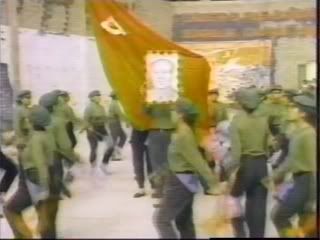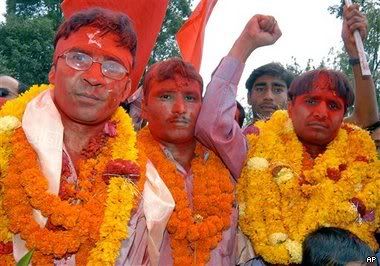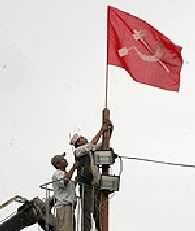The following article - translation mine - comes from the reactionary media and should, as always in such cases, be taken in a critical and skeptical manner. Luis Arce Borja, former editor of the revolutionary Peruvian newspaper
El Diario, among other figures, has stated that forces using the name “Communist Party of Peru” in the region referenced in this article are associated with a so-called faction called
Proseguir (Continue), which allegedly rejects the line of fighting for “peace accords” and allegedly presently upholds the pre-1992 program of the Communist Party of Peru. In other words, the PCP Regional Committee in the Apurímac-Ene River valley may never have abandoned the road of people’s war.
Many international forces, including the individual Arce Borja, have been dismissive of all the groups using the moniker “Communist Party of Peru” as a whole. In this context, the question confronting communists outside of Peru is:
1) How is the experience of the people’s war in Peru from 1980-1992 to be summed up? 2) What are the contributions of Abimael Guzman to the experience of international communist movement? 3) Can (relatively) definite conclusions be drawn about the relationship of Abimael Guzman, Elena Iparraguirre, and other PCP leaders to the capitulationist line that emerged in 1993? 4) How can communists and revolutionaries outside Peru provide moral-political support to the Peruvian revolutionaries?These questions are important. Revolutionaries in Peru undoubtedly, to the extent possible under their conditions, pay attention to the political lines emanating from the international communist movement. More often than not, they are hearing absolutely nothing with regard to Peru. PCP may have been organizationally and even more importantly politically disarticulated in the course of sustaining the severe blows of the enemy. Correct analysis of the course of the Peruvian revolution is a service to those struggling in Peru. Perhaps even more importantly, correct analysis provides a service to those struggling outside Peru, attempting to assimilate the lessons of the whole experience of the world proletarian revolution.
Article: Sendero Luminoso Threatens Garcia
In a communiqué they announce the beginning of its "armed resistance" to the Aprista (APRA - Garcia’s social democratic party –K) government.
Looking for international impact and gratuitous propaganda, Sendero Luminoso announced in a communiqué, that it is preparing to initiate "armed resistance" against the government of Alan Garcia Perez, whom they accuse of having selectively assassinated Senderistas during his first government, according to the Notimex news agency.
The terrorists also point their weapons against the first vice-president, Luis Giampietri, whom they label as being the executor of the orders of Garcia to kill the Senderista prisoners in the El Fronton prison, in June of 1986.
But there is more. According to the Mexican news agency, Sendero Luminoso not only announced the reorganization of its columns in the jungle and the mountains of the country for its "armed resistance,” but it also advanced that it would initiate its fight in a type of revenge against the elect president.
"We are going to fight and resist the government of Garcia, the one responsible for several massacres. This criminal will have to pay by his crimes,” runs one of the phrases of the communiqué reproduced by Notimex.
In addition, the terrorists assured in their communiqué that they are ready to take up arms. "We still have operational capacity, although one is told that there are no armed actions or that we are decimated,” they emphasized.
According to Notimex, the communiqué is signed in the Amazonian jungle of Satipo, an area where the terrorist columns are allied with the drug traffickers known as the Apurímac-Ene River valley.
EVIDENCE AGAINST ALAN
In an attempt to gain the attention of questionable human rights organizations, the message "remembers" that in the previous government of Garcia (1985-1990) and in the administration of Alberto Fujimori (1990-2000), “selective annihilations" of Senderistas were committed.
"Those two governments kidnapped, annihilated and disappeared hundreds of young people, adults and children suspected of belonging to (Sendero Luminoso),” they maintained.
Also, they asserted that they have evidence concerning the presumed intellectual participation of Garcia Perez - through his present vice-president, Admiral Luis Giampietri - in the military operation of to put down the bloody riot at El Fronton.
Referring to the Fujimori government, the criminal organization indicated that it knows of evidence that implicates Martin Rivas as the person responsible for the annihilations by the paramilitary group Colina.
"In name of the democracy he tortured and disappeared presumed militants of (Sendero Luminoso)". With this phrase the communiqué concludes, representing its followers in the Apurímac-Ene River valley, numbering 200 fighters.
Luis Giampietri: "We have a ready counter-subversive strategy"
Confident in the military power of the State and its strategy to confront the terrorist threat - thus was the first vice-president-elect, Luis Giampietri, yesterday after learning of the Senderista communiqué that threatens the Aprista government with unleashing a spiral of violence in the country.
"If we are to take a military attitude, we are taking it at this moment, of analyzing this threat - we will face it. We have a counter-subversive strategy towards these remnants, that for intelligence reasons we will not reveal now,” he indicated.
In that sense, he states that although the APRA hopes to govern on the basis of harmony in all of the country, it does not mean that they will doubt using force at the suitable moment.
Nevertheless, the admiral in retirement affirmed that he trusts that those delinquent hordes will not be able to take armed actions that are not localized in the Ene Valley, and that they are incapable of operating in other zones of the country and in Lima.
Old Tactics
Also, he (Gaimpietri) states that the Sendero Luminoso is resorting to old tactics of using messages through mass media to intimidate to the population with "military threats.”
Giampietri clarified, in addition, that the terrorists continue with their double game of wanting to fight by means of the political route and also by means of the trigger and the powder. "On the one hand they present themselves as being legalists and on the other hand they threaten war. Sendero always has used legalism as one of its weapons. I always said that the problem of Sendero has not been finished and it will be necessary to attentively follow this narcoterrorist version,” he expressed.
Finally, the sailor in retirement avoided commenting on the responsibility that Sendero attributes to him in the communiqué concerning the slaughter of Senderista criminals that occurred during the first Garcia Perez government.
http://www.ednoperu.com/noticia.php?IDnoticia=26451












